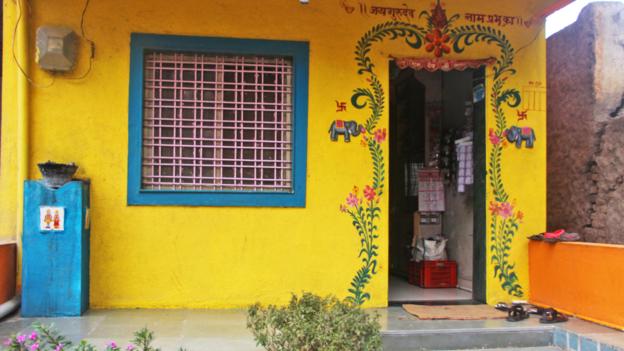This post may contain affiliate links. We may earn money or products from the highlighted keywords or companies or banners mentioned in this post.

Imagine a village where homes have no front doors, shops are always left unlocked and locals never feel unsafe.
This is the story of Shani Shingnapur in India’s Maharashtra state, where villagers eschew security because of their undying faith in Lord Shani, the god of Saturn, who is considered the guardian of the village.
Legend has it that about 300 years ago, after a bout of rain and flooding, a heavy black slab of rock was found washed up on the shores of the Panasnala River, which once flowed through the village. When locals touched the 1.5m boulder with a stick, blood started oozing out of it.
Later that night, Shani appeared in the dreams of the village head, revealing that the slab was his own idol. The deity ordered that the slab should be kept in the village, where he would reside from here on. But Shani had one condition: the rock and its colossal powers must not be sheltered as he needed to be able to oversee the village without hindrance. Shani then blessed the leader and promised to protect the village from danger.
After the villagers installed the huge slab on a roofless platform in the heart of town, they decided to discard all doors and locks. They didn’t need them anymore, not with the Lord to watch over them.
This tradition has continued for generations. Locals occasionally lean wooden panels against their front door frames to keep stray dogs out – but they have no permanent doors, and leave their jewellery and money unsecured, firmly believing that their holy guardian will protect them from any mishap. Even the public toilets in the village square just have a thin curtain at the entrance for privacy.
New constructions have to honour these protocols, too. The police station – which only opened in September 2015 and has not yet received a single complaint from the villagers – has no front door; while the United Commercial Bank opened India’s first “lockless” branch in Shani Shingnapur in 2011, installing a glass entrance in the spirit of transparency and a barely visible remote-controlled electromagnetic lock in respect of the villagers’ beliefs.
Locals are so nonchalant that they don’t even ask their neighbours to watch over their house while they are out of town. They believe that thieves will immediately be punished with blindness, and anyone dishonest will face seven-and-a-half years of bad luck. In fact, local lore says that when one villager installed wooden panes at the entrance of his house, he had a car accident the very next day.
Because of this strange history, Shani Shingnapur attracts devotees from across India. At least 40,000 visitors pour in each day to see the once-humble shrine that has grown into a large temple with extensive property and donations.
Although Shani Shingnapur has officially remained free from thefts for centuries, a 2010 visitor reported that cash and valuables worth 35,000 rupees were stolen from his vehicle. Another theft of gold ornaments worth 70,000 rupees was reported in 2011. However the charges were dismissed as the villagers insisted that they took place outside the village.
Sceptics argue that the low crime rate in the area is due to the village’s remote location rather than the miraculous powers of the lord.
Whatever the truth, times are changing and some villagers are challenging this age-old custom, seeking permission from the gram-panchayat (local self-government organisation) to install doors and locks to ensure the safety of their family.
But most villagers at Shani Shingnapur hope that the tradition will continue – that Shani continues to protect them from every evil eye for many centuries to come.
If you liked this story, sign up for the weekly bbc.com features newsletter, called “If You Only Read 6 Things This Week”. A handpicked selection of stories from BBC Future, Earth, Culture, Capital, Travel and Autos, delivered to your inbox every Friday.










